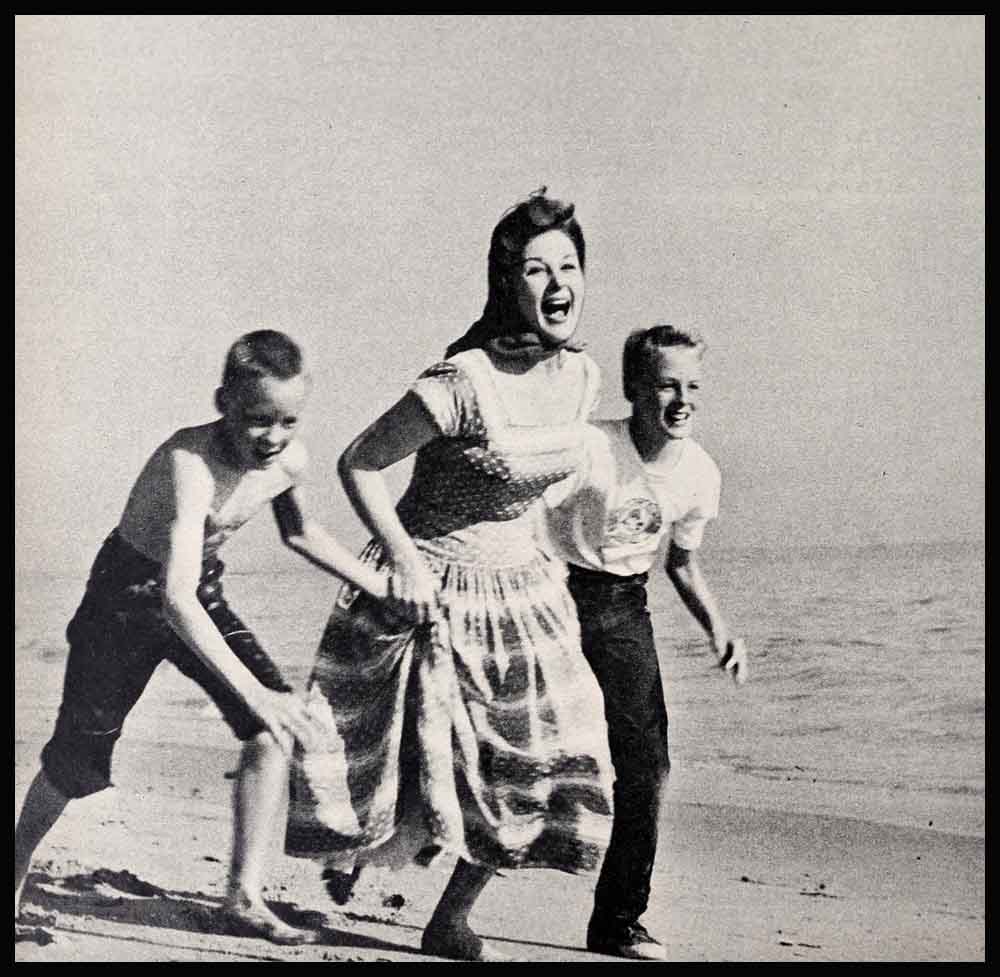
Brooklyn’s Child Is Full Of Faith
It was a cool gray afternoon and the rain was softly falling and splattering against the windowpane. Susan Hayward turned on the small table lamp near the sofa and started a slow fire burning in the great brick fireplace, which brought a touch of added warmth to the lovely gray and yellow living room.
Sitting down slowly on the sofa near the fire, she started to talk. Halting and pensive words. “Ever since I was a little girl,” she said quietly, “I have always believed what my father had told me. ‘Susan,’ he would say, ‘as long as you believe, an angel sits on your shoulder and looks after you.’ As I grew older, that angel became less real, it became more a symbol of God, of a beneficent power, whatever you want to call it. As long as I believed in it, no problem seemed too big for me to meet, no day seemed without hope. Only when I forgot to believe, when I failed to trust, did I despair and permit the problems of career, of maintaining a home for my sons, of personal frustrations to overcome me.”
What Susan didn’t have to add was that even on that terrible day, three months ago, when life seemed too tragic for her to continue, even then, a power pulled her through, helped sustain her. There were other times when faith pulled her out of despair. Like the time she was on tour, appearing at a small theatre in Canada. She had a personal problem that seemed to engulf her. When she arrived at the theatre, she went to her dressing room, sat down and tried to think. It was useless. Her problem was too secret, too grave to share with anyone. Where was her faith. the courage she’d always had with which to face life with a smile, if not with a laugh? For a moment the red-haired girl almost hated herself for her black and desperate mood. There were other performers around, but she felt too dispirited even to talk with them. Disconsolately, she walked out onto the still darkened stage. On the apron of the curtained stage only a single work light burned, throwing strange shadows into the wings. Three or four kneeling stagehands were working on a piece of scenery, oblivious of the unhappy girl nearby.
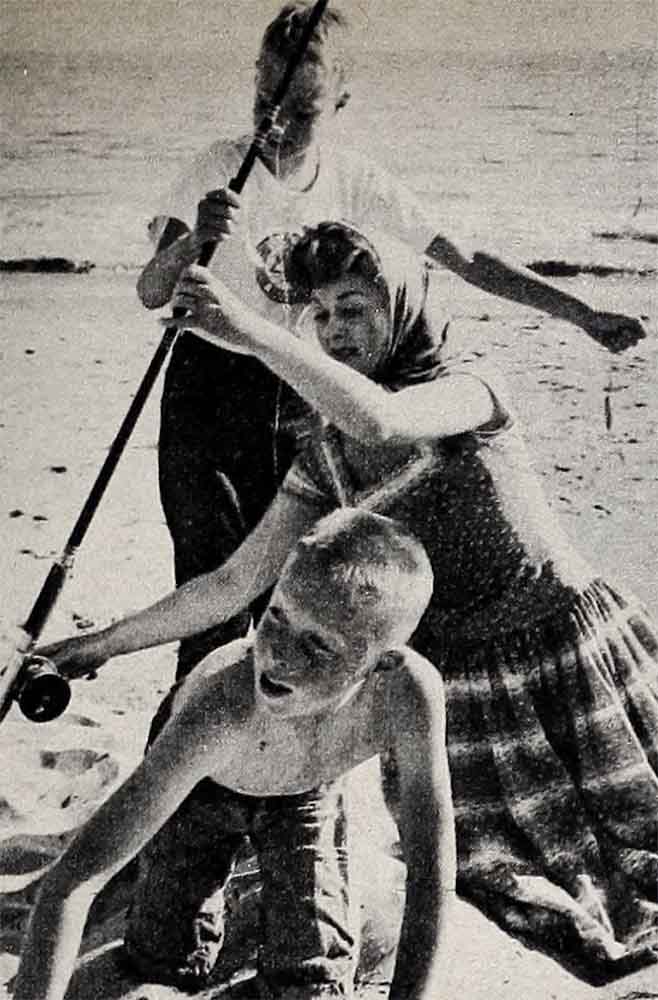
Suddenly, as the actress walked across the stage, one of the stagehands stood up. “Hey, Jim,” he called to an unseen fellow worker, “is Walter Marrener around? Send him over, will you?”
The actress stopped, startled. Had she heard the man right, heard him actually say “Walter Marrener?” Unbelieving, the actress went over to the stagehand who had spoken. “Tell me,” she said slowly, “is there really someone here named Marrener?”
“Why, yes, miss,” said the man. He turned, pointing. “Here he comes now. Do you know him?”
“Walter Marrener was my father’s name,” said the girl. “He died four years ago.”
Trembling, the actress stared at the stagehand who had just arrived. He was tall, rugged, friendly featured, but no one she had ever seen before. “My father was Walter Marrener,” the girl explained again. “He was French-Huguenot, a subway trainman in Brooklyn. My name is Edythe Marrener—my real name, that is. They call me Susan Hayward.”
“It’s a small world,” smiled the stagehand, “and who’s to say your father and I were not related? I’m French-Huguenot, too, and it’s not too common a name, Marrener, so maybe we had a mutual relative, way back in the past. I’d be happy to think so.”
“God bless you,” said the girl who had been Edythe Marrener. Her eyes were shining now and, suddenly, for the first time in many days, she felt lighthearted, gay and carefree again. “God bless you, Walter Marrener, for what this has done for me.”
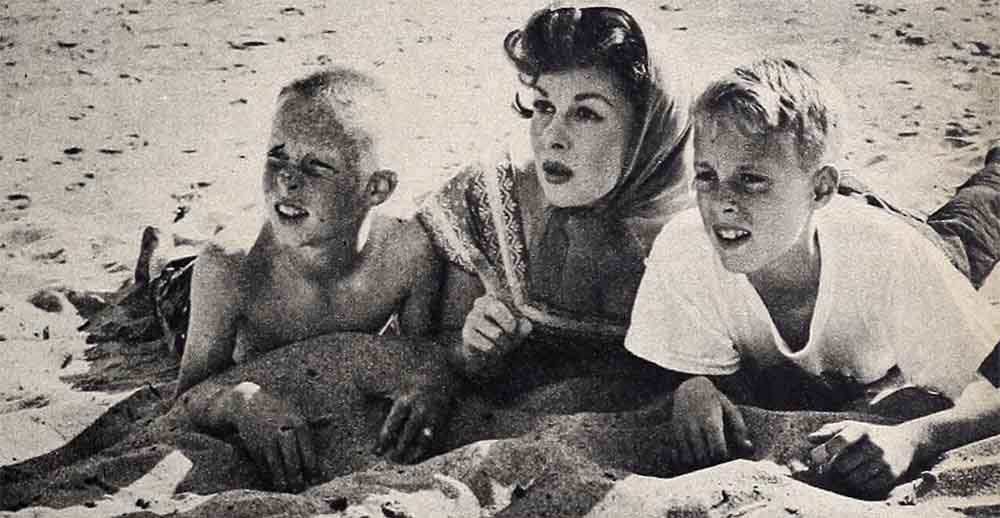
Remembering that day, Susan Hayward sat before the fireplace in her gray-and-yellow living room, looked up and smiled. “It was,” said Susan, “one of the unforgettable moments in my life. What had disturbed me was something I can’t reveal, not even now. I’ve never even talked about this before. But I know that I was miserable; I seemed lost and forsaken. And then all at once, hearing my father’s name called out on that strange and darkened stage, I felt that I had been given a sign, a touch of a guardian hand on my shoulder. ‘Someone,’ I whispered to myself, ‘is caring for you.’ ”
Faith, with Susan, is a “passionate intuition.” Several years ago, when Susan was in Georgia making “I’d Climb the Highest Mountain,” she was in her room one evening, resting after the day’s shooting, when she picked up the Gideon Bible on her table, leafed through it and impulsively decided to read a speech from the second book of Samuel, the one about David and Bathsheba. Susan’s studio was already beginning to plan the filming of that story, but no one as yet had been announced for the leading roles. As Susan read on, she was possessed by an overpowering presentment that it would be she who would play Bathsheba.
“I had the strangest feeling that I would be the one,” said Susan. “Perhaps it was because I so much wanted to do it. Then, a few days later—this was while we were still working on ‘I’d Climb the Highest Mountain’—I had a very early call for an upcoming scene. An assistant director came over to my cottage to wake me. He knocked on the door, made sure I was up, then said:
“ ‘Susan, I’ve got some news for you. The word just came through from Darryl Zanuck that you’re going to do Bathsheba’
“The assistant director,” Susan went on, “thought he was softening the blow of having to wake me so early by bringing me the good news. But for me, that message was something more—it was proof again of the magic of believing.”
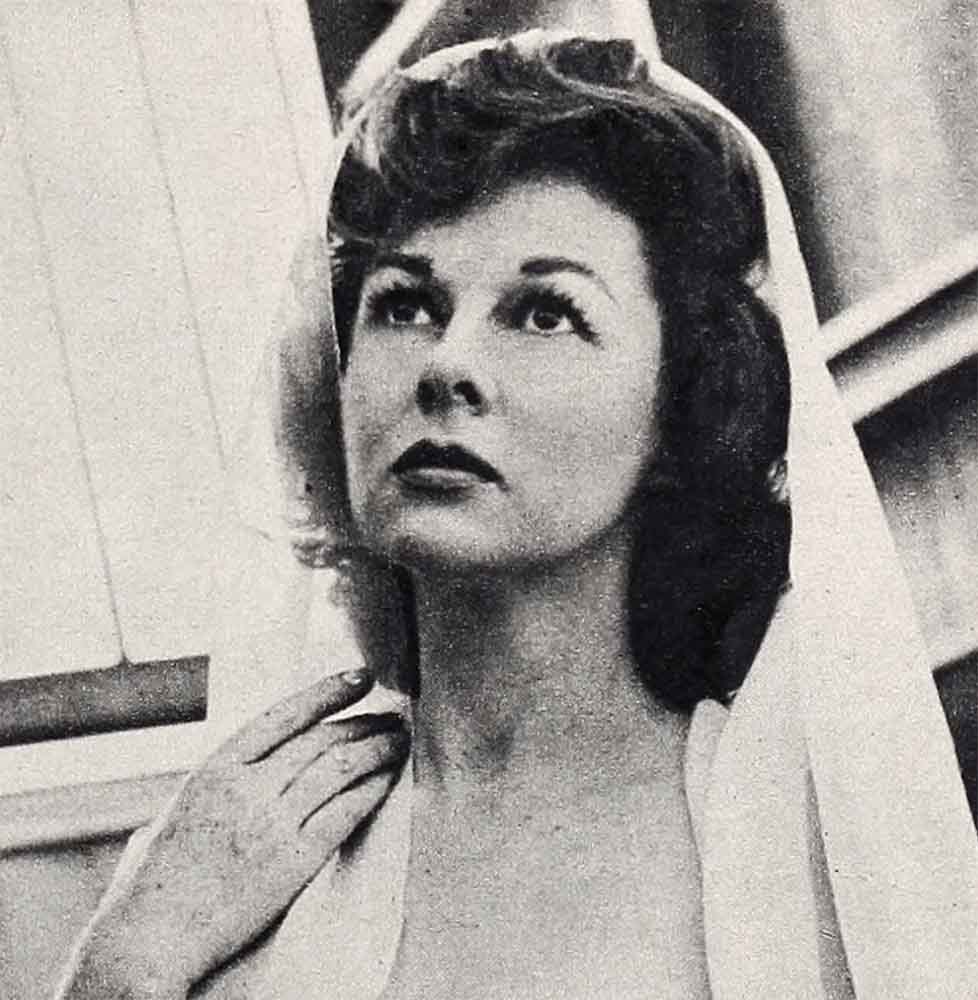
Faith has always been a part of Susan’s home life, even as a child. Always, from her father and mother, she learned the lesson that as a man thinketh, so shall he be. “My father,” said Susan, “taught me from childhood to fight for whatever I believed in. He was always saying, ‘You must be like a rubber ball. The harder they hit you, the higher you’ll bounce. That is, if you’re a good ball to start with. And if you’re not, you might as well give up anyway.’
“And mother—it was she who believed I could do anything I set my mind to. It was she, too, who always fought our inclination as youngsters to say, ‘I can’t do this, or I can’t do that,’ by telling us not to say we can’t do a thing, because of course we could do anything anyone else could.
“My grandmother,” laughed Susan, “came from County Cork, and she once told me she had actually dreamed about the man she was going to marry. She just knew it was he. Well, she met him and married him—that’s how much faith she had. I remember, too, the stories my mother used to tell me about my brother Wally’s illness. As an infant he had a serious abdominal condition—an obstruction that made it all but impossible for him to retain food. My mother took care of him herself, virtually breathed life into him again. At two he weighed only seven pounds. The illness had left his legs weak and he had to wear braces. One day it was time to get new braces, so she took Wally in her arms and got on a streetcar to go downtown. On the streetcar Mother noticed a woman in the seat opposite glancing over sympathetically. ‘You look troubled,’ said the woman to my mother. ‘I am indeed,’ said my mother, and poured out her heart about Wally’s illness.
“Then the stranger said, ‘Take off the braces; he will be all right.’ And you know something? He was. My mother knew then that Wally would live and be strong and well again. Do you see now why we have always felt that for us the omens were right?”
There was the time, too, when the six-year-old Susan was run over by a car and suffered such severe injuries that she spent the next seven months in a waist-high cast, and a year and a half after that on crutches. “I remember,” said Susan, “that the doctors said I’d never walk again. But I walked. And later, some of my drama school teachers said I’d never be an actress. But I kept heart and didn’t believe them. The thought of failure never entered my mind.”
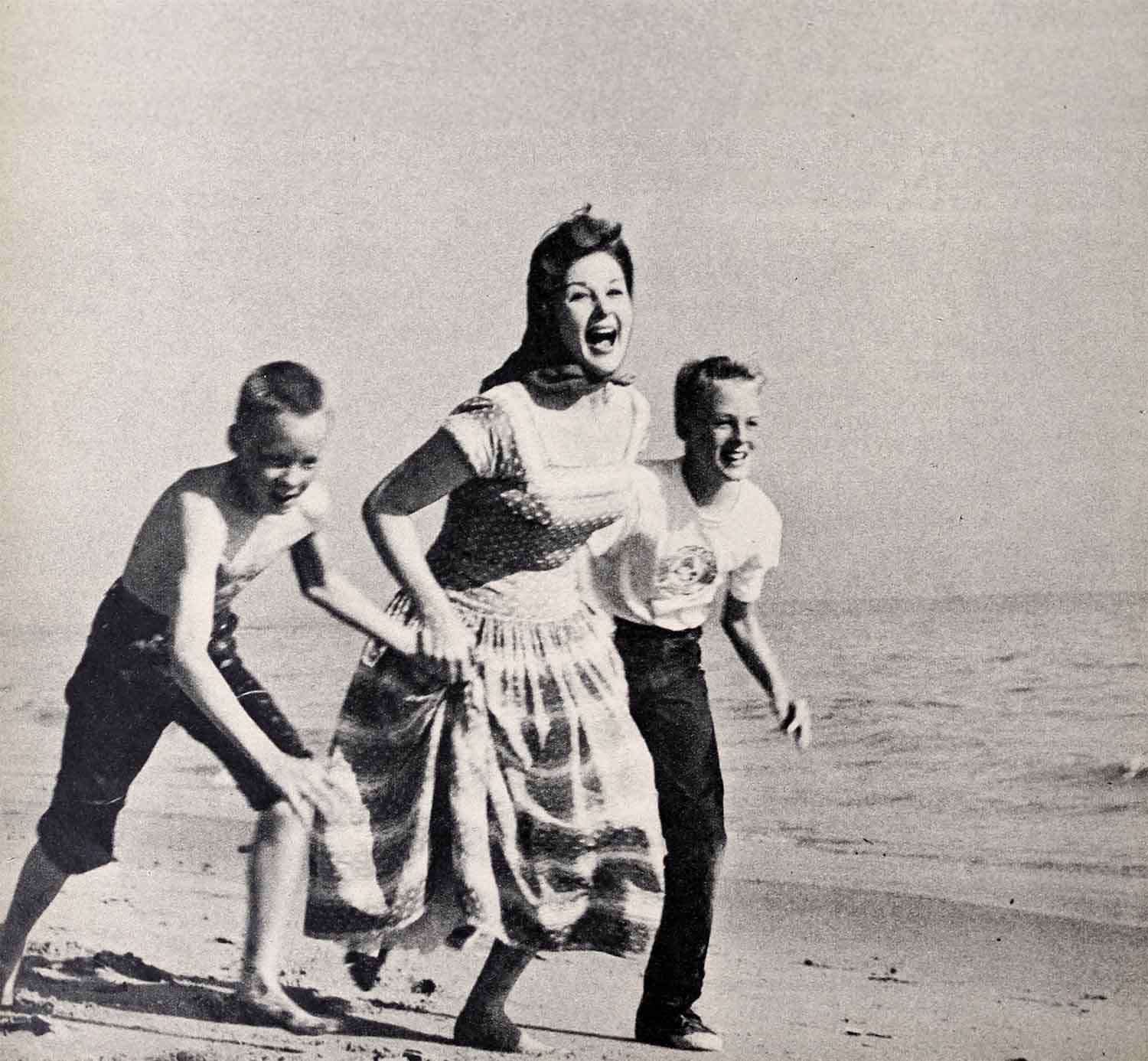
Most of her life, Susan has based her de-asked me what I thought. ‘Killing anybody would be murder.’ I explained. ‘no matter how bad a man might be.’ And then I tried to tell him something about why men make war. how differences in ambitions and desires and languages can cause so much hatred.
“Timmy just looked at me, trying to understand. Then he said, ‘But Mother, don’t they all speak the same language in their hearts?’ ”
There have been times, as Susan confesses, when her own faith faltered—when, as she says, “I got off the beam. I’ve made mistakes, felt discouragement as everyone has. Sometimes I ignored that angel on my shoulder, gave way to doubts or petty selfishness, did things to hurt, as all of us do. Then I was really in trouble—until I was shown the right path again.”
As Susan has learned, every doubt mars faith’s perfection, and our fear thoughts are just as creative or just as magnetic in attracting troubles to us as are the constructive and positive thoughts in attracting positive results. She remembers what happened in Georgia once, when she was on location, and how it took the faith of friends to restore her own faith in herself.
“We were working deep in the heart of the backwoods country,” Susan recalls, “among the friendliest, kindest people I’d ever met. They were like kin to me, because some of my own family had come from that part of the South. The townspeople, most of whom were appearing in the picture, had gone out of their way to be nice to me. I counted many of them among my warmest friends.
“Then, just when I felt the happiest, some New York newspaper ran a story saying I had criticized the town folk. I was horrified; I hadn’t even talked to the person who by-lined the story, and I couldn’t believe that any paper would say such things when they were so untrue. When I discovered that the local Georgia paper had picked up the story, I really exploded. I rushed, screaming, to the director. I even phoned the studio in Hollywood. Then I went back to the location spot, feeling as though I wanted to sink into the earth. I was sure nothing I could say or do would repair the horrible damage or regain the affections of the people I admired and liked.
“That was when I learned that my friends, the townspeople, had shown more faith in me than I myself had had. They had seen the story, yes, and they’d been hurt and unhappy—but only for me. They were even afraid to show me the newspaper for fear they’d make me miserable. When they discovered that I’d actually seen the paper, they came to me, some even with tears in their eyes. ‘We know it isn’t true, Susan,’ they said. ‘We know you well enough to realize you wouldn’t ever say such things.’
“I felt ashamed to think I had shown so little faith in the good will of my friends, and I thought to myself of a line I’d read somewhere: ‘How prone to doubt, how cautious are the wise!’ Well, I learned how wrong I’d been, and then we all got together and cried, and wiped our eyes and smiled again, grateful that nothing had really changed between us.”
The thing that happened to Susan’s nine-year marriage, the collapse of what was seemingly an idyllic union, was not a lack of faith. Not, at least, on Susan’s part. Those who know the real truth are aware that it was largely Susan’s faith—the complete and utter belief that the marriage would work—which kept it together as long as it did. When the marriage finally failed, Susan could only take refuge in her own philosophy: that what is supposed to happen, happens—and hope even more strongly for a brighter future.
Because she is also realistic and, above all, frank, Susan is not a girl to depend upon faith alone. As she herself says, hazel eyes sparkling, “Hayward will get into the act somehow, no matter what.”
She does not rely merely on indulging in a period of watchful waiting; she believes in a muscular faith, in going to work, always keeping the goal in mind. For instance, in driving to the studio for the first day of a new picture, Susan has a little ritual she likes to follow. If she turns on the car radio and gets a happy song or cheerful music, she knows then that the day will be a good one. But Susan, being Susan, is also not averse to helping fate along a little.
“If I don’t get the right tune right away,” she chuckles, “I sort of keep turning that little knob until I do. Sometimes, you know, you have to make your own luck.”
It’s like something Susan read about the Chinese, in a book called A Many-Splendoured Thing, by Han Suyin. “When a cloud threatens the moon on the first day of the New Year,” said Susan, “all the fishermen shout, beat cymbals and cry out. That’s because the fishermen know they must make a great noise to frighten the cloud away or the year will be unfavorable. When the narrator, who is a Eurasian girl, explains this curious custom to a friend, he laughs in disdain. ‘You don’t really believe that, do you?’ he asks.
“‘Of course,’ says the girl. ‘If we didn’t believe the unbelievable, what would happen to faith?’ ”
As for Susan, Brooklyn’s child is full of faith.
THE END
It is a quote. PHOTOPLAY MAGAZINE JULY 1955




